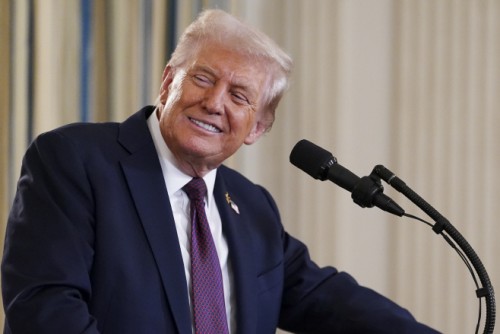 |
| U.S. President Donald Trump holds a joint press conference with Israeli Prime Minister Benjamin Netanyahu at the White House in Washington, D.C., on Sept. 29. / UPI-Yonhap |
US President Donald Trump on Monday reaffirmed plans to impose a 100% tariff on all films produced outside the United States, warning that foreign-made productions pose both an economic and national security threat. He also signaled steep tariffs on imported furniture.
Writing on Truth Social, Trump said the American film industry “has been stolen by other countries,” pledging that every movie made abroad would be subject to a 100% duty. He previously issued similar instructions in May, directing the Commerce Department and the U.S. Trade Representative to prepare the measure.
He argued that foreign governments were luring film producers and studios with aggressive incentives, describing such efforts as “joint actions” that amount to a threat to national security. “Along with everything else, it is about messaging and propaganda,” Trump wrote.
The proposal raises practical questions, however. As the Associated Press noted, many films and TV shows are distributed digitally rather than through formal import channels, making tariff collection unclear. It is also uncertain how the measure would apply to U.S.-backed films shot overseas, or what legal authority the administration would rely on.
 |
| A screen capture of the Netflix homepage, the global OTT platform, on Sept. 29. / Source: Screen capture |
Industry data highlights both strength and vulnerability. According to the Motion Picture Association of America, U.S. films generated $22.6 billion in exports in 2023, creating a $15.3 billion trade surplus. Yet Hollywood has increasingly relied on foreign production hubs such as Canada, the U.K., and Australia, which offer tax breaks, as well as on co-productions with Asian and European studios.
Reuters reported that U.S. production spending fell 26% year-on-year in 2023 to $14.54 billion, while the U.K. drew $5.91 billion, Canada $5.4 billion, Australia and New Zealand $2.04 billion, and Germany, Hungary, and the Czech Republic together about $1 billion.
Analysts warn that a blanket tariff could disrupt global streaming platforms like Netflix, where Korean and other international content has surged in popularity.
Trump also linked his tariff plan to broader trade grievances, vowing steep duties on furniture from countries that no longer manufacture in the U.S. “We will make North Carolina great again,” he wrote, lamenting that the state—once America’s leading furniture hub—had been hollowed out by cheap imports from China and other low-cost producers.
Most Read
-
1
-
2
-
3
-
4
-
5
-
6
-
7





















